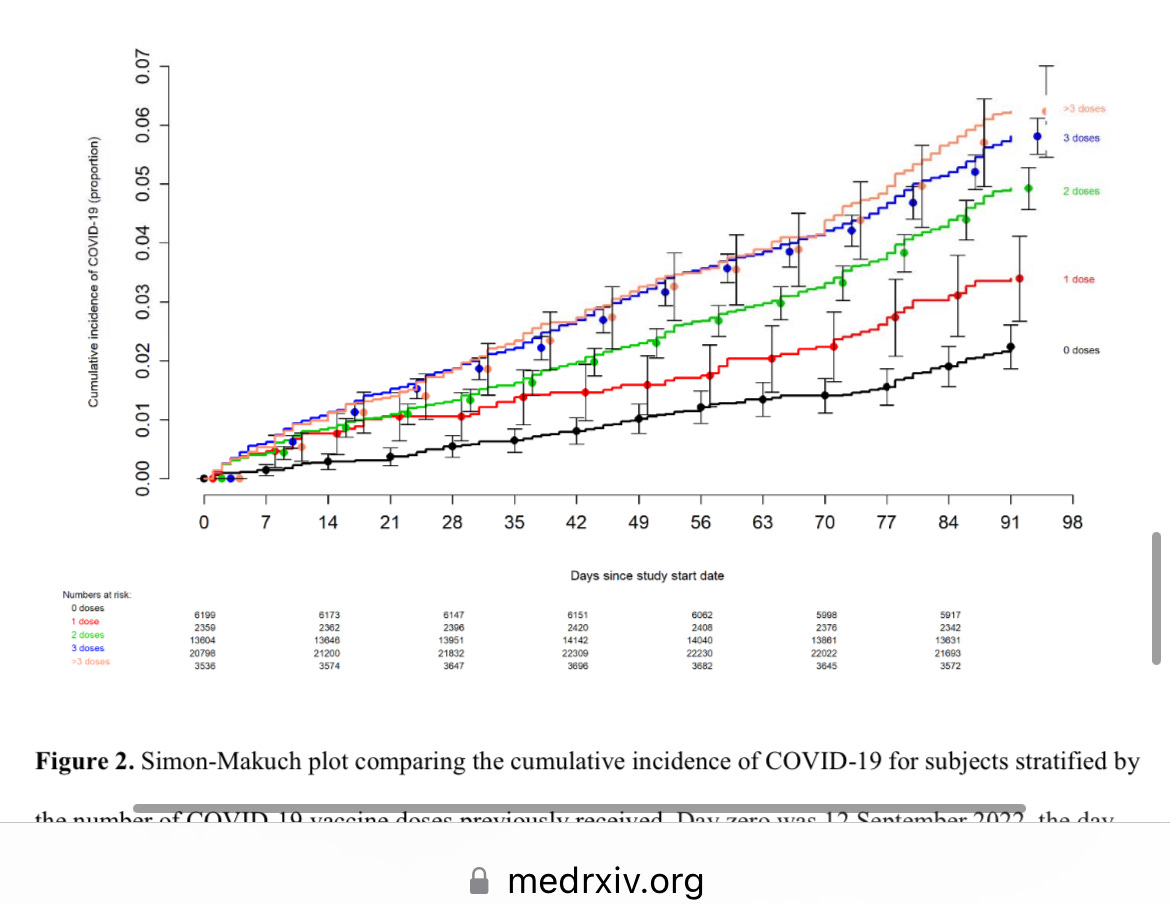Vaccine-driven original antigenic sin: it’s real and it’s getting worse.
People who have received mRNA Covid vaccines are at least twice as likely to be infected with the coronavirus as unvaccinated people, according to two new papers from researchers in Indiana and Ohio.
Worse, the newer of the two studies, which covered Omicron this fall, found risk actually rises with the number of shots.
People who had received three or more shots were more than three times as likely to be infected as those who hadn’t received any.

For people who have been vaccinated – especially those who have received a third or fourth shot – the papers will make for disturbing reading. They suggest vaccinated people may have few good options to protect themselves from infection should a more virulent variant of Omicron emerge.
The more disturbing of the two reports was posted only yesterday. It examines Covid infections this fall in about 50,000 workers in the Cleveland Clinic health-care system, about 10,000 of whom had received the bivalent booster.
The work is a “pre-print,” rather than a formal paper, meaning it has not been peer-reviewed, but the analysis is relatively straightforward and no one has suggested it is inaccurate.
The paper showed that the mRNA bivalent shots lowered the risk of Omicron infection by roughly 30 percent in the three months it was first offered in September. That protection is remarkably weak, considering it comes in the weeks when vaccine-generated antibodies are at their peak.
Other papers have also shown the mRNAs do little against Omicron. The more interesting and disturbing finding came when the researchers stratified risk of infection by the number of previous doses.
The result is remarkably clear. Each successive shot added to the risk of infection. People who had received more than three doses had almost a 6 percent risk of Omicron infection over a three-month period. Those who hadn’t been vaccinated had a risk of about 1.5 percent.
Adjusted for various risk factors, the people who had four or more doses had 3.4 times as much chance of being infected as those who had none.
(Mo shots, mo problems)

As the study’s authors wrote – in a classic example of scientific understatement: It is important to examine whether multiple vaccine doses given over time may not be having the beneficial effect that is generally assumed.
—
The first paper offered similar findings across an even larger dataset, although it covers an earlier period and the authors did not break down their findings by number of doses. Instead, they broadly compared vaccinated people with those who had previously been infected.
The paper was published last Wednesday in the American Journal of Public Health and covered 2021 and early 2022, through the start of last winter’s Omicron wave.
Using a database from the state of Indiana, the authors found that people who had been Covid vaccinated were more than twice as likely to be infected with Sars-Cov-2 as those who had a previous Covid infection.
The researchers found about 1 in 15 vaccinated people was infected, compared to 1 in 33 people who had a previous infection.
The study’s results are worse than they first look, because the researchers started counting 30 days after a vaccine recipient received the first dose, thus excluding the period immediately after the first dose in which many newly vaccinated people become infected.
They also stopped counting cases only after six months in each recipient. In other words, the study would not count Omicron infections in people vaccinated or infected before mid-June 2021 – and Omicron is known to defeat the vaccines more easily than earlier variants.
In other words, even in the period of maximum vaccine effectiveness, and even excluding many Omicron infections, almost 7 percent of vaccine recipients were infected in this study.
(The authors spun the results as positive by noting that the vaccinated people they studied had 37 percent fewer overall deaths as unvaccinated people. But that finding is almost certainly an artifact of what is called “healthy vaccine user bias.” People who are vaccinated tend to be healthier overall than those who are not, and physicians sometimes withhold vaccines from people near death because they don’t think those patients will benefit. The clinical trials that Pfizer and Moderna conducted showed no evidence that their mRNA vaccines reduced the overall risk of death – and deaths overall are far higher than normal this year in highly mRNA vaccinated countries.)
—
So far, Covid deaths have remained low this fall worldwide despite continuing waves of Omicron infection in the mRNA jabbed countries, because Omicron is far milder than earlier Sars-Cov-2 variants.
But these papers offer reason to worry that vaccinated people may never develop long-term immunity against Sars-Cov-2. And after a third dose, it is not even clear additional doses provide much short-term benefit. Even the temporary antibody boost from additional mRNA shots barely compensates for the fact that those antibodies work so poorly against Omicron.
Taken together, the two papers offer strong new evidence this fall’s “bivalent” boosters will be the final gasp for mRNA Covid vaccines.
The public has already largely rejected the bivalents. The Biden Administration spent $5 billion on 171 million bivalent doses this summer. But despite aggressive government marketing and media pressure, about 80 percent of eligible American adults have not taken the new mRNA shots.
Still, 20 percent have. And most adults, not just in the United States but in all the mRNA countries worldwide, have received not just their primary Covid shots but at least one booster.
These studies suggest that they – and the public health authorities who pressed the shots on them – may have made a bad bet.
Source – https://alexberenson.substack.com/p/urgent-two-new-studies-show-mrna
